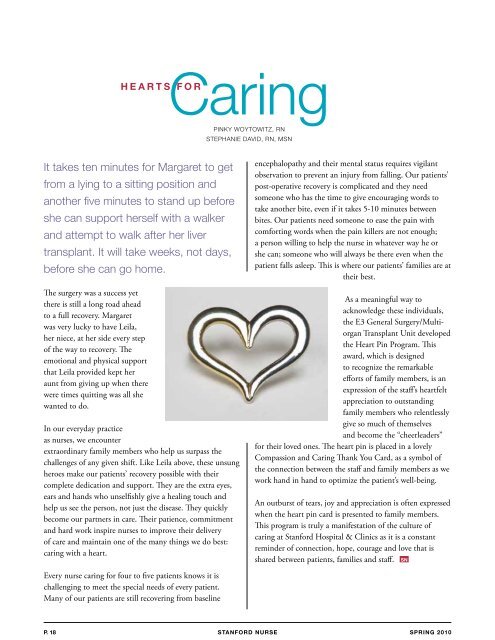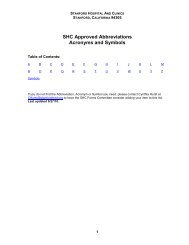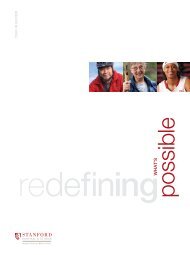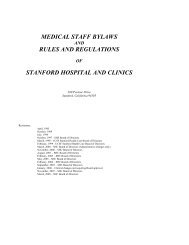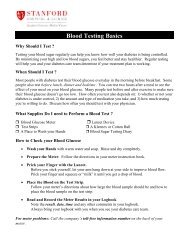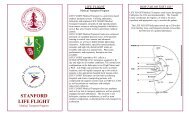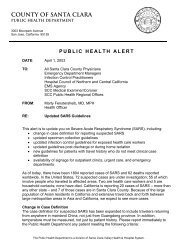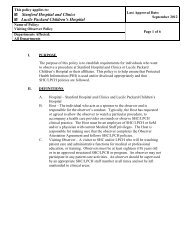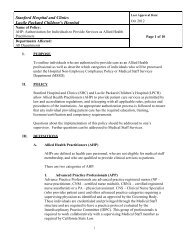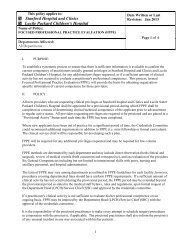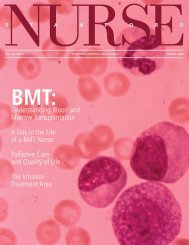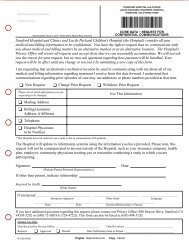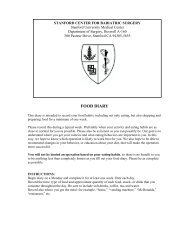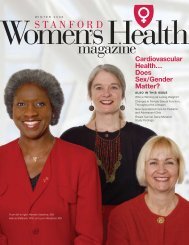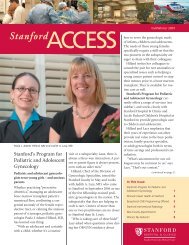SpRiNG 2010 - Stanford Hospital & Clinics
SpRiNG 2010 - Stanford Hospital & Clinics
SpRiNG 2010 - Stanford Hospital & Clinics
You also want an ePaper? Increase the reach of your titles
YUMPU automatically turns print PDFs into web optimized ePapers that Google loves.
It takes ten minutes for Margaret to get<br />
from a lying to a sitting position and<br />
another five minutes to stand up before<br />
she can support herself with a walker<br />
and attempt to walk after her liver<br />
transplant. It will take weeks, not days,<br />
before she can go home.<br />
The surgery was a success yet<br />
there is still a long road ahead<br />
to a full recovery. Margaret<br />
was very lucky to have Leila,<br />
her niece, at her side every step<br />
of the way to recovery. The<br />
emotional and physical support<br />
that Leila provided kept her<br />
aunt from giving up when there<br />
were times quitting was all she<br />
wanted to do.<br />
h E A R T S F O R<br />
In our everyday practice<br />
as nurses, we encounter<br />
extraordinary family members who help us surpass the<br />
challenges of any given shift. Like Leila above, these unsung<br />
heroes make our patients’ recovery possible with their<br />
complete dedication and support. They are the extra eyes,<br />
ears and hands who unselfishly give a healing touch and<br />
help us see the person, not just the disease. They quickly<br />
become our partners in care. Their patience, commitment<br />
and hard work inspire nurses to improve their delivery<br />
of care and maintain one of the many things we do best:<br />
caring with a heart.<br />
Every nurse caring for four to five patients knows it is<br />
challenging to meet the special needs of every patient.<br />
Many of our patients are still recovering from baseline<br />
Caring<br />
PInKy WOyTOWITz, rn<br />
sTePHanIe DaVID, rn, Msn<br />
encephalopathy and their mental status requires vigilant<br />
observation to prevent an injury from falling. Our patients’<br />
post-operative recovery is complicated and they need<br />
someone who has the time to give encouraging words to<br />
take another bite, even if it takes 5-10 minutes between<br />
bites. Our patients need someone to ease the pain with<br />
comforting words when the pain killers are not enough;<br />
a person willing to help the nurse in whatever way he or<br />
she can; someone who will always be there even when the<br />
patient falls asleep. This is where our patients’ families are at<br />
their best.<br />
As a meaningful way to<br />
acknowledge these individuals,<br />
the E3 General Surgery/Multiorgan<br />
Transplant Unit developed<br />
the Heart Pin Program. This<br />
award, which is designed<br />
to recognize the remarkable<br />
efforts of family members, is an<br />
expression of the staff’s heartfelt<br />
appreciation to outstanding<br />
family members who relentlessly<br />
give so much of themselves<br />
and become the “cheerleaders”<br />
for their loved ones. The heart pin is placed in a lovely<br />
Compassion and Caring Thank You Card, as a symbol of<br />
the connection between the staff and family members as we<br />
work hand in hand to optimize the patient’s well-being.<br />
An outburst of tears, joy and appreciation is often expressed<br />
when the heart pin card is presented to family members.<br />
This program is truly a manifestation of the culture of<br />
caring at <strong>Stanford</strong> <strong>Hospital</strong> & <strong>Clinics</strong> as it is a constant<br />
reminder of connection, hope, courage and love that is<br />
shared between patients, families and staff. SN<br />
p. 18 STANFORD NURSE<br />
<strong>SpRiNG</strong> <strong>2010</strong>


